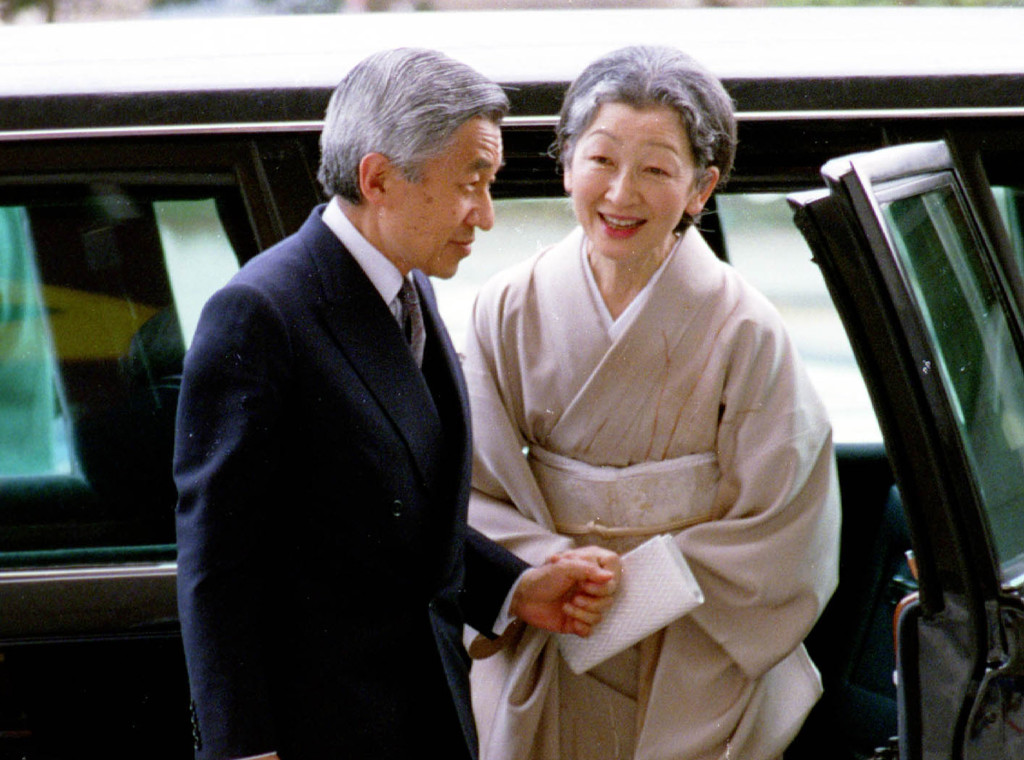
TOKYO — Emperor Akihito expressed rare “deep remorse” over his country’s wartime actions in an address Saturday marking the 70th anniversary of Japan’s World War II surrender, a day after the prime minister fell short of apologizing in his own words to the victims of Japanese aggression.
Prime Minister Shinzo Abe, meanwhile, stayed away from a contentious Yasukuni shrine that honors war criminals among other war dead. He instead prayed and laid flowers at a nearby national cemetery for unnamed fallen soldiers ahead of the annual ceremony at Tokyo’s Budokan hall.
That ceremony started with a moment of silence at noon to mark the radio announcement by Emperor Hirohito, Akihito’s father, of Japan’s surrender on Aug. 15, 1945.
“Reflecting on our past and bearing in mind the feelings of deep remorse over the last war, I earnestly hope that the ravages of war will never be repeated,” Akihito said in his speech. Japanese media said it was the first time he had used the words “deep remorse” in reference to the war in his annual war-end anniversary speech.
Akihito also emphasized that Japan’s peace and prosperity stand on “the people’s tireless endeavors and their earnest desire for peace,” and renewed his war-renouncing pledge.
Even though they are subtle and still rather neutral, remarks by the emperor on Japan’s wartime past in recent years have caught attention, often portrayed in the media to contrast Abe’s nationalist and hawkish image, especially as he pushes to give Japan’s military an expanded role and change Japan’s pacifist constitution.
Abe, who also spoke at the memorial service, avoided any reference to the damage caused by Japan’s aggression for the third year in a row since he took office in December 2012.
Instead, as if talking to the spirits of the war dead, Abe thanked them for the sacrifice on which he said Japan’s peace and prosperity are built.
Abe did promise, however, to “face the past” and “never to repeat the calamity of the war.”
On Friday, Abe issued a closely monitored statement, acknowledging damage and suffering on innocent people but falling short of apologizing in his own words to the victims of Japan’s aggression.
His statement had been widely anticipated because of his past remarks on historical issues that suggested a revisionist stance. He has repeatedly said there is no clear definition of aggression, and has denied that Japan’s wartime government coerced foreign women to become military prostitutes, citing lack of documentary evidence.
Friday’s statement drew mixed reactions from overseas — including criticism from China and South Korea, and praise from the United States. South Korean President Park Geun-hye said the statement “left a lot to be desired,” and China called it evasive.
On Saturday, Abe donated Shinto-style religious ornaments for the shrine, as he has done since his last visit, in December 2013, which triggered uproar from China and South Korea. However, two of his Cabinet ministers prayed at the shrine, and a group of about 60 national lawmakers also visited Yasukuni on Saturday.
The lawmakers say they merely wanted to pay respect to those who sacrificed their lives for their country. But because Yasukuni enshrines mostly soldiers, many see it as a symbol of Japan’s past militarism.